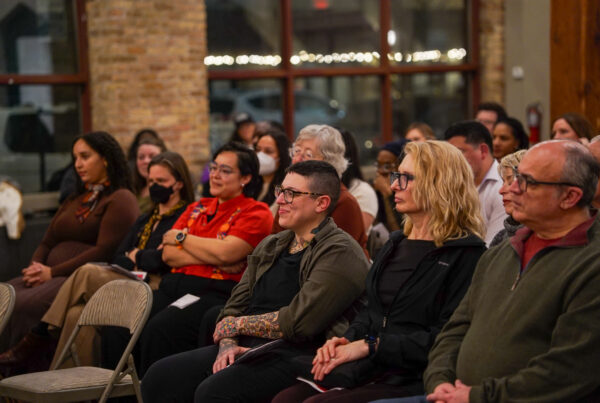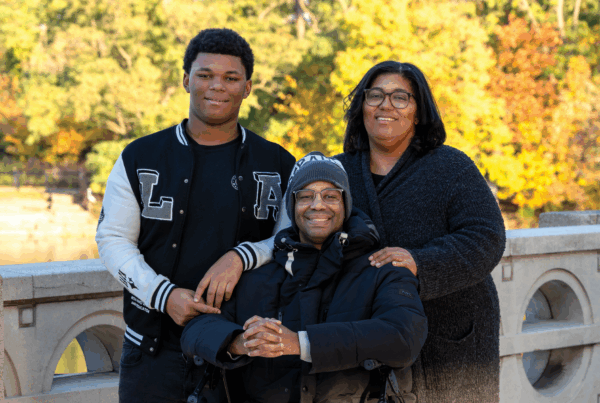
By Sam Paler-Ponce, interim associate director of policy
Chicago Coalition for the Homeless assembled 27 statewide partner organizations in filing an amicus brief in the upcoming case of Johnson v. Grants Pass. On the docket to be heard for oral arguments on April 22, 2024, this will be the first time in decades that the U.S. Supreme Court is hearing a case related to homelessness.
“Homelessness is not something you can sweep under the rug. It needs to be solved in a positive way,” said Robert Henderson, a grassroots leader with Chicago Coalition for the Homeless. “Punishing a person for being homeless is cruel and unusual, and it is not right.” Henderson was living on the street when he first worked with Chicago Coalition for the Homeless as a legal client. In 2018, he became the first person to successfully bring a case under the Illinois Homeless Bill of Rights.
Originating from Grants Pass, Oregon, the Supreme Court will determine if cities have the right to penalize people for sleeping outdoors if they have even a blanket to stay warm, particularly when they have nowhere else to go. At the heart of the matter lies the interpretation of constitutional protections against cruel and unusual punishment.
“The best solutions to the homelessness crisis in this country are creating sufficient affordable housing and providing supporting social services to help individuals stay housed,” said Camilla Krauss, a drafting attorney on the brief. “Criminalizing a person experiencing homelessness for simply existing in the elements not only creates bad precedent but also serves to exacerbate, rather than solve, the core issues.”
“Homelessness is a public health and affordable housing crisis, requiring urgent, meaningful and collaborative action across many sectors. Fines and jailing are traumatizing to people experiencing homelessness and disrupt work towards real solutions,” said Lisa Parsons, Legal Director at Legal Council for Health Justice and a drafting attorney on the brief.
The case challenges the practice of cities like Grants Pass, which resorted to penalizing people sleeping in public spaces with bedding, such as a blanket, despite the absence of shelter in the community.
Chicago Coalition for the Homeless (CCH), alongside 27 partner organizations, filed an amicus brief (relating to amicus curiae, meaning “friend of the court”), raising the importance of the case and the impact on people experiencing homelessness in Chicago and Illinois. Pro bono partner Much Shelist supported CCH in filing the brief, and attorneys Steven Blonder, Josh Leavitt, and Charlotte Franklin were instrumental in drafting the brief.
“The measure of a society is how it treats its most vulnerable. It demonstrates the character and compassion of the citizenry, and our country has made significant advances in the care and sheltering of those experiencing homelessness,” said Steve Blonder, principal at Much Shelist. “A reversal of the Ninth Circuit’s decision would be a major step backward – to a society less caring and more medieval.”
“With homelessness and evictions most seriously impacting Black Americans, criminalizing homelessness is an additional way to make living while Black illegal and must be stopped if we are ever to attain a just society,” said Michelle Gilbert, Legal and Policy Director at the Law Center for Better Housing, a drafting organization on the brief.
“A negative outcome in this case would exacerbate the challenges faced by people living with HIV and other chronic conditions who are also experiencing homelessness, creating additional barriers to accessing the support and services they need to transition out of homelessness and manage their chronic health conditions,” said Nadeen Israel, Senior Vice President of Policy and Advocacy at AIDS Foundation Chicago.
While the case of Johnson v. Grants Pass serves as a focal point for legal debate, it also highlights the systemic failures that perpetuate homelessness nationwide. Punitive measures like incarceration and fines exacerbate the issue, rather than resolving it. The real solution lies in ensuring safe, decent, and affordable housing.
“This case could affect the thousands of Illinois survivors seeking shelter and create further barriers to accessing safe housing,” said Jaclyn Zarack-Koriath, Director of Housing Advocacy at The Network: Advocating Against Domestic Violence.
As the Supreme Court prepares to deliberate on this landmark case, the outcome holds significant implications for the quarter of a million people nationwide who find themselves without shelter on any given night.
“An adverse outcome in this case could make the families we serve even more vulnerable and unstable,” said Karen Freeman-Wilson, Chief Executive Officer at Chicago Urban League, an advocacy organization that works to achieve equity for Black families and communities through social and economic empowerment.
CCH joins the National Homelessness Law Center and hundreds of other organizations that have submitted 39 amicus briefs in support of people experiencing homelessness.
Amicus brief partners: AIDS Foundation Chicago, All Chicago Making Homelessness History, BEDS Plus, Inc., Chicago Coalition for the Homeless, Chicago Rehab Network, Chicago Urban League, Chicago Women Take Action, Covenant House Illinois, Deborah’s Place, Farmworker and Landscaper Advocacy Project, Healthcare Alternative Systems, Inc, Heartland Alliance Health, Housing Action Illinois, Illinois Public Health Institute, Impact for Equity, James B. Moran Center for Youth Advocacy, Law Center for Better Housing, Legal Council for Health Justice, LYTE Collective, North Suburban Legal Aid Clinic, Organized Communities Against Deportations, Red Line Service Institute, Safer Foundation, South Suburban PADS, Street Samaritans, The Network: Advocating Against Domestic Violence, The Night Ministry, and Thresholds.






